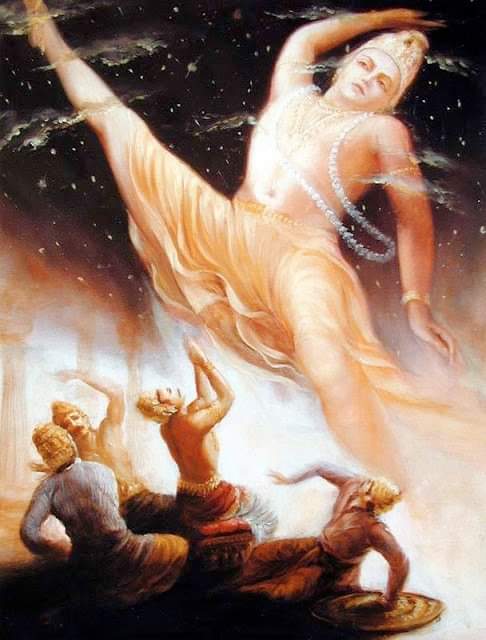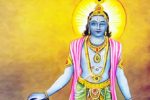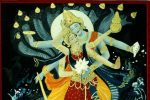NAME 78
Vikramaḥ विक्रमः
Kramaṇa means transgression and vi-kramaṇa means without transgression. Viṣṇu is the lord of dharma śāstra-s. He never transgresses śāstras. All the śāstras originate from Him. Vikramah – One with Giant Strides
This name can be interpreted in 4 different ways.
A person of great Valour as in the earlier Nama Vikrami (76th naama).
A person of Giant Strides (Trivikrama Avataram).
A person who helps you to cross the Ocean of Samsaara.
A person who uses the bird Garuda as his carrier. In Sri Adi Sankara’s words this is explained as ‘Vina Garudena Pakshinaa Kramaat – He moves around on the bird Garuda’. ‘Vi’ refers to the King of birds, Garuda; and ‘Krama’ refers to His Sanchara or flight on the Garuda around the World.
Vikram is an appellation that had come to Vishnu as a result of His Supernatural Act of measuring the universe with three steps. Also, Vi means the “king-of-birds”, the white-necked eagle; Krama means steps and, therefore, ‘movement or travel’. In this sense Vikram can mean: “One who rides on the white-eagle (mind) is Vishnu”-who is described as having Garuda for His vehicle (Vahanam).
७८. ॐ विक्रमाय नमः |
78. OM Vikramāya Namaḥ
Vikramah -While describing the term Vikramee (75) we had already explained the meaning contents of Vikrama, and thus Vikrama is an appellation that had come to Vishnu as a result of His Supernatural Act of measuring the universe with three steps.
Also, Vi means the “king-of-birds”, the white-necked eagle; Krama means steps and, therefore, ‘movement or travel’. In this sense Vikrama can mean: “One who rides on the white- eagle (mind) is Vishnu”-who is described as having Garuda for His vehicle (Vaahanam).
Vicakrame / विचक्रमे He measured the entire universe. Or Vinā – Garuḍena – pakṣiṇā krāmati / विना – गरुडेन – पक्षिणा क्रामति as He rides the bird Garuda, otherwise called Vi / वि.
Vikramah He who crosses (Karmana) i.e. transcends samsara. Or one who has Vih, bird i.e. Garuda as His mount.
INTERPRETATION GUIDED BY SANT VANI (WORDS OF SAINTS)
Vikramaḥ
The one who measured the entire universe.
Being Viśhva, He is all. Being Viṣhṇu, He is all-pervasive, pervades all the three worlds.
Being Īśvara, He is all-powerful and hence the overlordship.
He who is beyond the clutches of Samsāra and can help his devotees cross (Kramaṇa) the ocean of Samsāra . He who has Viḥ (Garuḍa) as his Vāhana and traverses at speeds faster than that of the mind (Śaṅkara). He whose Vāhana is the “King of the birds” Garuḍa – who is the very embodiment of the supreme knowledge of the Vedas (Parāsara Battar).
The Bhagvatam talks about the fifth avatara of Viṣhṇu as Vāmana. King Mahābali, a valiant asura, was a generous king who engaged in severe austerities and conquered the whole world. Even though he became benevolent, he became pompous of his accomplishments. Indra and other devatas, thinking that the Asuras would conquer all the worlds went to Viṣhṇu for help. Vāmana, in the guise of a short Brahmin, went to the king to request three paces of land, measured by his feet.
Mahābali, being a generous King consented, against the warning of his guru, Sukracharya.
Vāmana then revealed his identity and grew and grew and enlarged to gigantic proportions to stride over the three worlds. He stepped from heaven to earth with the first step, from earth to the other world with the second. There was still one more step to take but no place that remained uncovered. King Mahabali unable to fulfill his promise, offered his head for the third, as he was
not someone who went against his own word. Vāmana then placed his foot and pushed the King to pātala and said that he would rule that world. Indra and the other devatas were now happy that their position was restored.
The Lord as Vāmana measured the entire world with His three steps. As the one who traversed the entire jagat, He is called Vikrama.
‘Vi’ means Garuda. Vinā ramati–also as one who moves around on Garuda, the king of the birds as His vehicle, He is known as Vikrama.
Garuḍa is symbolic of the mind as well as air – wind at the level of the macrocosm and the breath at the level of the microcosm and the speed of his flight across the sky is symbolic of the mind. The symbolism of the serpents that he has on his body as ornaments are indicative of the power to control the vagaries of the mind. The flapping of his wings blow away the clouds of darkness and delusion.
The story of Garuḍa waging war against Indra-Deva and the other Devas in order to get Amṛtā, the nectar of immortality and free his mother from slavery can be viewed as a symbolic representation of how in order to be truly free and to realize the “nectar of the divine” within, one has to conquer and transcend the sense organs (Indriyas). When Garuḍa is victorious and has defeated all the Devas including Indra, he gets to see the divine form of Viṣhṇu who then bestows Garuḍa with the boon of being his (Viṣhṇu‘s) Vāhana!
With the Universal Supreme Consciousness Viṣhṇu himself mounted on Garuḍa, there is nothing that is impossible.
Shri Vedanta Desikar, a brilliant vaishnavite philosopher of the post-Ramanuja period says in his Garuḍa-Dandakam that Garuḍa is symbolic of the the five Prāṇa-vāyus: prāṇa, apāna, vyāna, udāna, and Samāna and with these in balance, and the Manas (mind) reined-in one can soar on the golden wings of Garuḍa towards Viṣṇu – for isn’t Garuḍa a permanent resident of Vaikuntha (as Vedanta Desikar notes)?
It is the beauty of Hindu Dharma that we have such magnificent guardian-gatekeeper deities – Garuḍa, Nandi to name just two – they are the great guardians to the world of the super conscious and they can when properly propitiated and approached open the gateways to the Supreme being. These are deities that can bring order and structure into the Sādhaka‘s life and bring his/her Sādhana into a natural and proper flow.
The Garuḍa Gayatri Mantra when chanted regularly bestows courage and fearlessness and takes one closer to Viṣṇu
ॐ तत्पुरुषाय विद्महे सुवर्णपक्षाय धीमहि तन्नो गरुडः प्रचोदयात् |
Oṃ tatpuruṣāya vidmahe suvarṇapakṣāya dhīmahi tanno garuḍaḥ pracodayāt |
OR
“ॐ पक्षिराजाय विद्महे पक्षिदेवाय धीमहि तन्नो पक्षिः प्रचोदयात्”
“Om Pakshirajay Vidhmahe Pakshi Devay Dheemahi Tanno Pakshi Prachodyat”



